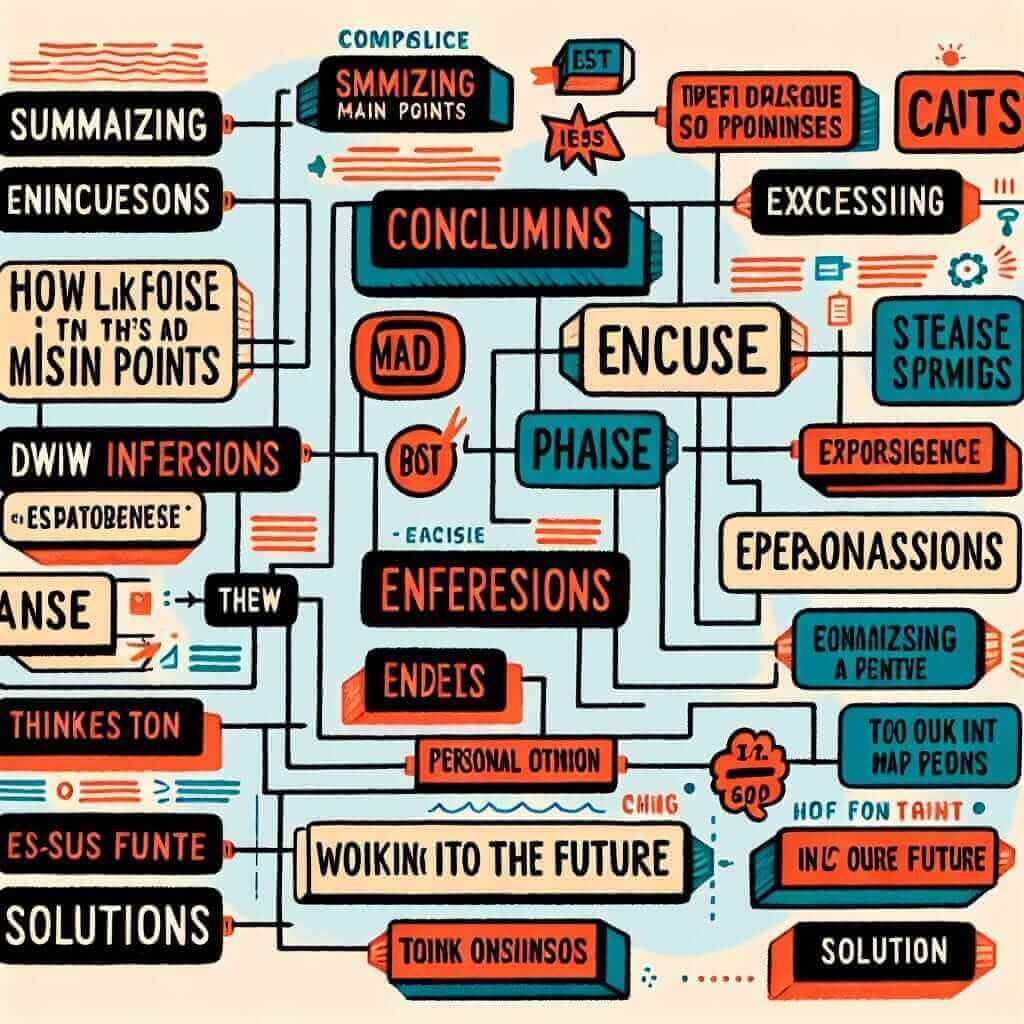“In conclusion” – a phrase we’ve all used countless times. But is it appropriate for the formal writing required in IELTS? What about other concluding phrases? This article delves into the nuances of crafting effective conclusions for your IELTS essays, equipping you with the tools to impress examiners and boost your band score.
Let’s consider these examples:
- In conclusion, governments must invest heavily in renewable energy sources. (General statement)
- Ultimately, striking a balance between economic growth and environmental protection is crucial. (Emphasizing a key takeaway)
- These findings suggest that early language exposure significantly impacts cognitive development. (Drawing inferences from data)
Each of these concluding phrases serves a distinct purpose, demonstrating how subtle language choices can elevate your writing.
Understanding the Role of Conclusion Phrases in IELTS Writing
While “in conclusion” effectively signals the end of your essay, using it repeatedly can make your writing seem mechanical and repetitive. IELTS examiners value a varied and sophisticated vocabulary. This is where understanding Latent Semantic Indexing (LSI) keywords comes in. LSI keywords are terms related to your primary keyword (“in conclusion” in this case), enriching your writing and demonstrating a broader grasp of vocabulary.
Effective Alternatives to “In Conclusion”
Here’s a breakdown of powerful alternatives, categorized for specific applications:
Summarizing:
- To summarize: This phrase succinctly recaps the main points, suitable for summarizing arguments presented in the essay.
- In summary: Similar to “to summarize,” offering a concise overview of the key arguments.
- To conclude: A more formal alternative, signaling the final summation of your essay.
- All in all: Suitable for less formal essays, offering a general concluding statement.
Drawing Inferences & Expressing Opinions:
- Therefore: This transitional word logically connects the preceding arguments with your final conclusion.
- Thus: Similar to “therefore,” indicating a logical consequence or inference drawn from the essay’s content.
- As a result: This phrase highlights the outcome or consequence of the arguments presented.
- Consequently: Another way to express a cause-and-effect relationship, leading to your final conclusion.
- It can be concluded that: A more formal phrase suitable for presenting a well-supported conclusion.
Looking Ahead & Offering Solutions:
- Moving forward: This phrase introduces a call to action or recommendations based on the essay’s arguments.
- In light of this: This phrase emphasizes the significance of the arguments and their implications for the future.
- The evidence suggests that: This phrase reinforces the conclusion drawn from the evidence presented in the essay.
- Ultimately: Emphasizes the most crucial takeaway or final thought of your essay.
Applying Conclusion Phrases in IELTS Essays
Let’s see these phrases in action within the context of an IELTS Task 2 essay:
Question: Some people believe that economic growth should be the main priority for developing countries, while others argue that environmental protection is more important. Discuss both views and give your opinion.
Sample Conclusion:
“In conclusion,” both economic development and environmental protection are essential for developing countries. However, it is my firm belief that environmental sustainability should not be sacrificed for short-term economic gains. Ultimately, a balanced approach that prioritizes both is crucial for long-term prosperity and well-being.
By substituting “in conclusion” with “ultimately” and adding a contrasting viewpoint using “however,” the conclusion becomes more sophisticated and impactful.

Common Errors to Avoid
- Introducing new arguments in the conclusion: The conclusion should synthesize, not introduce new information.
- Repeating the introduction verbatim: While mirroring the key themes is recommended, avoid directly copying the introduction.
- Using informal language or contractions: Maintain a formal tone throughout the essay, including the conclusion.
For more insights on crafting compelling conclusions, explore these resources:
By mastering the art of using varied and appropriate conclusion phrases, you can confidently demonstrate your language proficiency and elevate your IELTS writing to a band 7 or 8 level. Remember, a strong conclusion leaves a lasting impression on the examiner, significantly influencing your overall score.